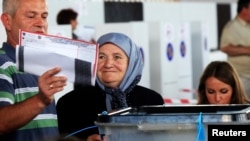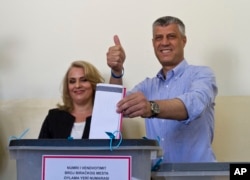The ruling Democratic Party of Kosovo is claiming victory and a likely third term for Prime Minister Hashim Thaci.
Early results from Sunday's parliamentary election give the party 31 percent of the vote while the main opposition Democrat League of Kosovo has 25 percent.
A non-partisan exit poll also puts Thaci's party in front.
The former guerilla fighter is the only leader Kosovo has had since winning independence from Serbia in 2008.
He says a successful election will send a message to Europe that Kosovo is a democracy.
"Today is a special day for our country and for the citizens of Kosovo. I congratulate all of Kosovo's citizens. I call upon them to take part in the elections, for the elections to be fair, and to send a message to Europe that we are a democratic country," Thaci said.
Challenges ahead
Thaci's popularity soared when the former independence rebel announced a break from Serbia in 2008, but political analyst Nexhmedin Spahiu said it was far from certain he would win re-election since "he has been weakened politically by his failure to address the main challenges in our society," the French news agency AFP reported.
Frustration with Kosovo's progress is running high among many of its 1.8 million people, who rank among Europe's poorest.
Landlocked Kosovo has one of the lowest living standards in Europe, with average monthly wages of 350 euros ($476), nearly half the population living in poverty.
Unemployment is stuck at 35 percent, rising to 55 percent among the young, according to the Kosovo Statistics Bureau.
Four hours before the polls closed, only 25 percent of eligible voters had cast their ballots, the electoral commission reported. That was nearly 10 percent less compared with 2010 elections turnout at the same time, AFP reported.
However all eyes were on the turnout from the Serb minority in the north, voting for the first time since Kosovo broke away from Serbia, where first reports indicated a
low number of voters at the polling stations.
A high turnout from the 120,000-strong Serb community would be seen as a boost to Thaci's dream of joining the 28-nation EU, after last year's historic agreement on improving Kosovo's ties with Belgrade.
Although Serbia still rejects Kosovo's independence, it has encouraged Serbs to vote, to strengthen the 2013 deal which allowed it to begin its own EU entry talks.
Voters weigh in
Faik Mustafa voiced optimisms that "these elections would make a change for better".
"We had high expectations from independence, but little came true," a 49-year-old driver told AFP after casting his ballot.
However, some voters voiced their displeasure.
“This old class of politician has been around for 15 years and had plenty of time to profit,” said Muhamet Maqastena, a trader in the capital, Pristina. “It's time for them to go and let the young, educated people govern us.”
Valbona Bajraktari, a 37-year-old unemployed woman, said her expectations were not high. “The only thing I want is for them not to steal or to hire their aunts,” she told Reuters.
Fighting back, Thaci's government raised public sector wages, pensions and social welfare benefits two months ago by 25 percent. That directly affects 240,000 teachers, doctors, police officers, pensioners and others, and even more indirectly.
Thaci has promised to do the same every year if given a new four-year mandate.
“Our state is a new European state, a state that has great opportunities, and I'm committed to making the most of them,” Thaci said after voting in a Pristina school.
If he wins a third term, Thaci will come under immediate pressure from the West to heed the findings of a war crimes investigation that threatens to ensnare his former comrades-in-arms.
Within weeks, a special European Union task force is expected to issue the findings of an investigation into allegations that Kosovo's guerrilla army harvested organs from Serb prisoners of war and sold them on the black market during a 1998-99 conflict.
The investigation followed a 2011 report by Council of Europe rapporteur Dick Marty that pointed the finger at Thaci and other ex-rebels, including four senior members of the prime minister's Democratic Party of Kosovo (PDK) and candidates for parliament.
Thaci has dismissed the allegations as an outrage, a bid to tarnish the Kosovo Albanian fight for freedom that eventually won NATO air support.
Fight against Serbia
The West wants a court set up abroad to hear the case because of witness intimidation in Kosovo and a graft-riddled legal system. That will require changes to the law and constitution.
Thaci was one of the leaders of the Kosovo Liberation Army that took up arms in the late 1990s to break free from the repressive rule of Serbia under strongman Slobodan Milosevic.
NATO intervened in 1999 with 78 days of air strikes against Serbia, trying to halt the massacre and mass expulsion of Kosovo Albanians by Serbian forces waging a counter-insurgency.
Kosovo declared independence almost a decade later and has been recognized by more than 100 countries, but not Serbia or its big-power backer Russia, which is blocking the young state's accession to the United Nations.
Its economy is forecast to grow by at least 3 percent this year, driven by construction and cash sent home by Albanians working abroad. Even that, however, is not enough to absorb the thousands of jobseekers entering the workforce every year in what is Europe's youngest society.
Some information for this report provided by Reuters and AFP.
Early results from Sunday's parliamentary election give the party 31 percent of the vote while the main opposition Democrat League of Kosovo has 25 percent.
A non-partisan exit poll also puts Thaci's party in front.
The former guerilla fighter is the only leader Kosovo has had since winning independence from Serbia in 2008.
He says a successful election will send a message to Europe that Kosovo is a democracy.
"Today is a special day for our country and for the citizens of Kosovo. I congratulate all of Kosovo's citizens. I call upon them to take part in the elections, for the elections to be fair, and to send a message to Europe that we are a democratic country," Thaci said.
Challenges ahead
Thaci's popularity soared when the former independence rebel announced a break from Serbia in 2008, but political analyst Nexhmedin Spahiu said it was far from certain he would win re-election since "he has been weakened politically by his failure to address the main challenges in our society," the French news agency AFP reported.
Frustration with Kosovo's progress is running high among many of its 1.8 million people, who rank among Europe's poorest.
Landlocked Kosovo has one of the lowest living standards in Europe, with average monthly wages of 350 euros ($476), nearly half the population living in poverty.
Unemployment is stuck at 35 percent, rising to 55 percent among the young, according to the Kosovo Statistics Bureau.
Four hours before the polls closed, only 25 percent of eligible voters had cast their ballots, the electoral commission reported. That was nearly 10 percent less compared with 2010 elections turnout at the same time, AFP reported.
However all eyes were on the turnout from the Serb minority in the north, voting for the first time since Kosovo broke away from Serbia, where first reports indicated a
low number of voters at the polling stations.
A high turnout from the 120,000-strong Serb community would be seen as a boost to Thaci's dream of joining the 28-nation EU, after last year's historic agreement on improving Kosovo's ties with Belgrade.
Although Serbia still rejects Kosovo's independence, it has encouraged Serbs to vote, to strengthen the 2013 deal which allowed it to begin its own EU entry talks.
Voters weigh in
Faik Mustafa voiced optimisms that "these elections would make a change for better".
"We had high expectations from independence, but little came true," a 49-year-old driver told AFP after casting his ballot.
However, some voters voiced their displeasure.
“This old class of politician has been around for 15 years and had plenty of time to profit,” said Muhamet Maqastena, a trader in the capital, Pristina. “It's time for them to go and let the young, educated people govern us.”
Valbona Bajraktari, a 37-year-old unemployed woman, said her expectations were not high. “The only thing I want is for them not to steal or to hire their aunts,” she told Reuters.
Fighting back, Thaci's government raised public sector wages, pensions and social welfare benefits two months ago by 25 percent. That directly affects 240,000 teachers, doctors, police officers, pensioners and others, and even more indirectly.
Thaci has promised to do the same every year if given a new four-year mandate.
“Our state is a new European state, a state that has great opportunities, and I'm committed to making the most of them,” Thaci said after voting in a Pristina school.
If he wins a third term, Thaci will come under immediate pressure from the West to heed the findings of a war crimes investigation that threatens to ensnare his former comrades-in-arms.
Within weeks, a special European Union task force is expected to issue the findings of an investigation into allegations that Kosovo's guerrilla army harvested organs from Serb prisoners of war and sold them on the black market during a 1998-99 conflict.
The investigation followed a 2011 report by Council of Europe rapporteur Dick Marty that pointed the finger at Thaci and other ex-rebels, including four senior members of the prime minister's Democratic Party of Kosovo (PDK) and candidates for parliament.
Thaci has dismissed the allegations as an outrage, a bid to tarnish the Kosovo Albanian fight for freedom that eventually won NATO air support.
Fight against Serbia
The West wants a court set up abroad to hear the case because of witness intimidation in Kosovo and a graft-riddled legal system. That will require changes to the law and constitution.
Thaci was one of the leaders of the Kosovo Liberation Army that took up arms in the late 1990s to break free from the repressive rule of Serbia under strongman Slobodan Milosevic.
NATO intervened in 1999 with 78 days of air strikes against Serbia, trying to halt the massacre and mass expulsion of Kosovo Albanians by Serbian forces waging a counter-insurgency.
Kosovo declared independence almost a decade later and has been recognized by more than 100 countries, but not Serbia or its big-power backer Russia, which is blocking the young state's accession to the United Nations.
Its economy is forecast to grow by at least 3 percent this year, driven by construction and cash sent home by Albanians working abroad. Even that, however, is not enough to absorb the thousands of jobseekers entering the workforce every year in what is Europe's youngest society.
Some information for this report provided by Reuters and AFP.












